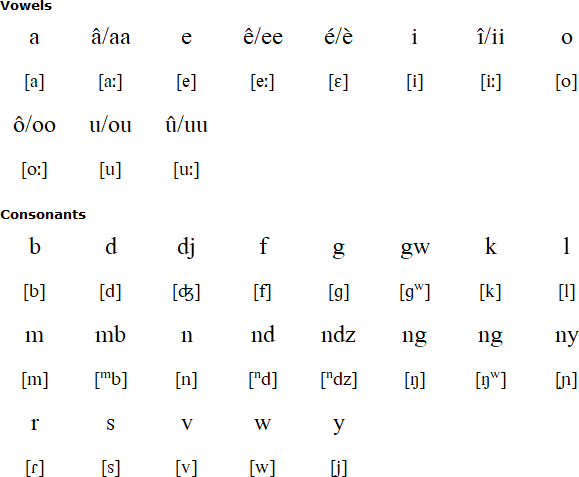Punu is a Bantu language spoken by about 168,500 people mainly in southern Gabon, and also in south of the Republic of Congo. In Gabon there are about 152,000 Punu speakers in Ngounié and Nyanga provinces, and there are about 16,500 speakers in the Niari department of the Republic of Congo.
Punu is also known as Ipunu, Pouno, Pounou, Puno, Yipounou, yi-punu or yiPunu. The native name is Yipunu. It is written with the Latin alphabet, although few Punu speakers are literate in their language.

Download an alphabet chart for Punu (Excel)
Information about Punu | Numbers
Information about Punu
https://en.wikipedia.org/wiki/Punu_language
https://www.ethnologue.com/language/puu
https://glottolog.org/resource/languoid/id/punu1239/a>
https://www.persee.fr/doc/jafr_0037-9166_1940_num_10_1_2490
https://www.cotedivoire.news/gabon/17061-langue-gabon-a-decouverte-de-langue-punu.html
Aka, Bafaw-Balong, Bangi, Basaa, Bemba, Bembe, Bena, Benga, Bhaca, Bube, Bukusu, Bulu, Central Teke, Chichewa, Chokwe, Chuwabu, Comorian, Dciriku, Digo, Duala, Eton, Ewondo, Fang, Ganda/Luganda, Gogo, Gusii, Gwere, Haya, Hehe, Herero, Ibinda, Ikizu, Ikoma, Jita, Kabwa, Kako, Kamba, Kiga, Kikuyu, Kimbundu, Kinyarwanda, Kirundi, Kisi, Kogo, Komo, Kongo, Konjo, Koti, Kukuya, Kunda, Kuria, Kwambi, Lambya, Lingala, Loma, Lozi, Luba-Katanga, Luchazi, Lunda, Luvale, Luyana, Makaa, Makonde, Makhuwa, Mandekan, Maore, Masaaba, Mbama, Mbere, Mbukushu, Mbunda, Mbuun, Mende, Mongo, Mpiemo, Mushungulu, Mwani, Nambya, Nande, Ngoni, Nkore, North Teke, Northern Ndebele (South Africa), Northern Ndebele (Zimbabwe), Northern Sotho, Nyamwezi, Nyakyusa, Nyemba, Nyole, Nyoro, Nyungwe, Nzadi, Oroko, OshiWambo, Pagibete, Punu, Ronga, Safwa, Sena, Sengele, Shona, Soga, Songe, Southern Ndebele, Southern Sotho, Sukuma, Swahili, Swati, Tanga, Tembo, Tonga, Tooro, Tshiluba, Tsonga, Tswa, Tswana, Tumbuka, Umbundu, Venda, Vili, Vwanji, Xhosa, Yakam, Yansi, Yao, Yasa, Yeyi, Zigula, Zinza, Zulu
Languages written with the Latin alphabet
Page created: 19.03.22. Last modified: 19.03.22
[top]
You can support this site by Buying Me A Coffee, and if you like what you see on this page, you can use the buttons below to share it with people you know.

If you like this site and find it useful, you can support it by making a donation via PayPal or Patreon, or by contributing in other ways. Omniglot is how I make my living.
Note: all links on this site to Amazon.com, Amazon.co.uk
and Amazon.fr
are affiliate links. This means I earn a commission if you click on any of them and buy something. So by clicking on these links you can help to support this site.
[top]